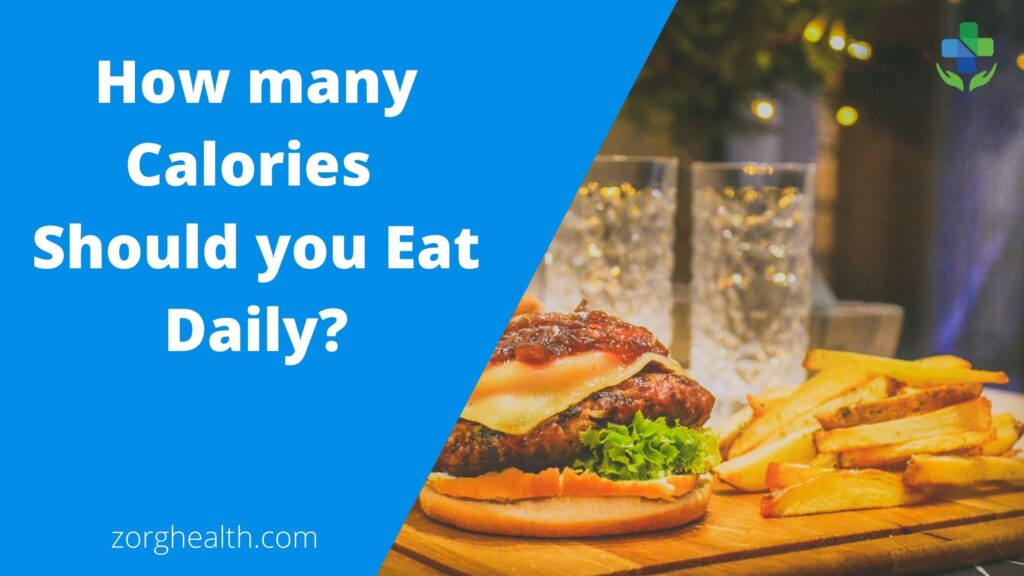Keeping a watch on calorie intake is of great importance for one’s health. Calories in things that our bodies consume contain energy that is needed to sustain life. All of the cells in our body need the energy to function and carry out metabolism. When we eat, calories in the food are used to release this energy which is either used by the body for vital functions or stored for later use depending on the body’s need. The most common question for having a fit body is how many calories should you eat daily?

What is a calorie?
A calorie is a unit of energy. It is just a measurement medium like a teaspoon or an inch. Calories are the amount of energy released when your body breaks down (digest and absorbs) food. And so, the more calories a food has, the more energy it will provide to your body.
There are two types of calories:
A small calorie (Cal) is the amount of energy required to raise the temperature of 1 gram of water by 1° Celsius (°C).
A large Calorie (kcal) is the amount of energy required to raise 1 kilogram (kg) of water by 1°C.
What are calories in food?
The amount of energy in food or drink is measured in calories. When we eat and drink more calories than what we use up, our bodies store the excess calories as body fat. There is something called empty calories. Empty calories are those that provide energy but very little nutritional value.
Why are calories important?
The human body needs calories to survive. Without energy, the cells in the body would die, the heart and lungs would stop functioning, and the organs would not be able to carry out the basic processes needed for living. But it doesn’t say that we eat whenever possible, as extra calories will harm your organs.
Are calories good or bad?
Calories aren’t bad for us. Our body needs calories for energy. But eating too many calories, and not burning enough of them off through activity- can lead to weight gain. There is always a good or bad side to each thing, similarly, there are good calories (low in cholesterol and which are easy to process) and bad calories.
If people know how to consume only the number of calories that are needed every day, they would probably have healthy lives. Calorie consumption that is too low or too high will lead to health problems.
The number of calories in food tells us how much potential energy they contain. It is not only calories that are important, but also the substance from which calories are taken.
Let’s solve the big question-How many calories should you eat daily?
The average adult non-obese person burns around 1800 calories a day doing absolutely nothing. If we go by the Healthy Eating Guide, just by sitting only you burn an estimated 75 calories per hour to carry out basic vital functions of the body.
How do we count the calories in food? It is impossible to know the calorie value of each food. To calculate food calories -start by looking at how much protein, carbohydrates, and fat the food has. Then, multiply the total number of grams of protein content in the consumed portion by 4, since 1 gram of protein is equal to 4 calories. Do the same thing for the carbohydrates, since 1 gram of carbohydrates is equal to 4 calories. But 1 gram of fat contains 9 calories.
Your daily calorie intake for maintaining a healthy weight depends on various factors:
- How old are you?
- How physically active are you?
- What is your BMI or Body Mass Index (the BMI for women is 21.5 and men is 22.5).
An ideal daily intake of calories varies depending on age, metabolism, and leveling of physical activity among other things. The recommended daily calorie intake is 2000 calories a day for women and 2500 for men.
How many calories should you eat daily for weight management?
Maintaining a healthy weight: Whether we want to gain, lose or maintain our current body weight, counting calories is crucial.
- Weight loss: For weight loss, a person needs to reduce at least the total calorie intake by 500 calories per day if they want to lose one pound weight a week. It means if we need 2000 Calories/ day, we should reduce it to 1500 calories/day to lose 1 pound a week. However, as losing weight is a slow process, it is highly advisable to be patient throughout your weight loss journey.
- Gaining weight: If anyone wants to gain weight try not to do it yourself and seek any professional help. An expert dietitian can come out with a weight gain diet plan according to our body’s needs to help us healthily gain weight.
Does water have any calories?
Plain water is calorie-free calories come from three nutrients in your diet- carbs, fats, and proteins. Alcohol- while not considered a nutrient contributes calories as well. Plain water is devoid of these nutrients and these contain no calories.
What are high-calorie foods?
Eating too many high-calorie foods can make us overweight or obese.
High-calorie foods are:
- Chocolate and sweets
- Crisps
- Biscuits
- Cake
- Ice-cream
- Fast food, burgers, fried chickens, or fries
- Pastries
Other foods, like peanuts, contain a lot of calories (half a cup of peanuts has over 400 calories).
What are low-calorie foods?
- Oats
- Greek yogurt
- Soup
- Berries
- Eggs
- Popcorn
- Chia seeds
- Fish
- Cottage cheese
- Potatoes
- Lean meat
Which fruits have the most calories?
- Avocado. Calories: 322 per the whole avocado.
- Figs. Calories: 150 per five small figs.
- Dates. Calorie: 1158 calories per 100 grams of pitted Medjool dates.
- Shredded coconut. Calorie: 466 per cup.
- Raisins. Calories: 429 per cup.
- Bananas. Calories: 121 per large banana.
- Prunes.
Fast facts on calories
- Essential for human health, the key is consuming in the right amount.
- Everyone requires different amounts of energy each day, depending on age, size, sex, and activity level.
- People in the outer countries consume more than 11% of their daily calories from fast food.
- Foods high in energy but low in nutritional value provide empty calories.
Sources of Empty Calories-
The parts of food that provide empty calories contain virtually no dietary fiber, amino acids, antioxidants, dietary minerals, and vitamins. These come mainly from solid fats and added sugar. The following foods and drinks provide the largest number of empty calories:
Solid fats and added sugar-
- Ice-cream
- Cookies
- Donuts
- Cakes
- Pastries
Solid fat-
- Ribs
- Sausage
- Bacon
- Cheese
- Hot dogs
Knowing the different number of calories these commonly eaten food items contain, will give a rough idea of the daily calorie intake you need to keep your body weight where it is and to make a lifestyle healthy and fit.
